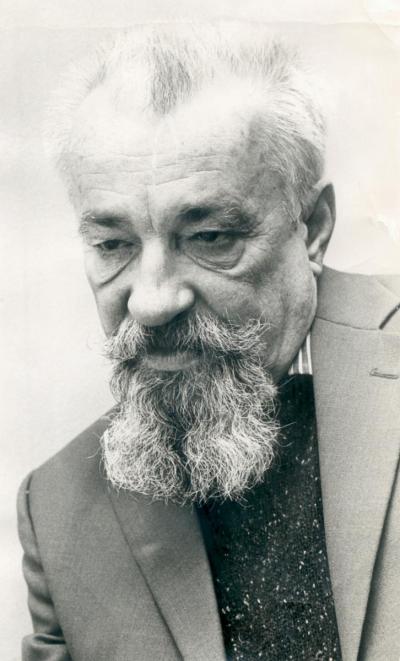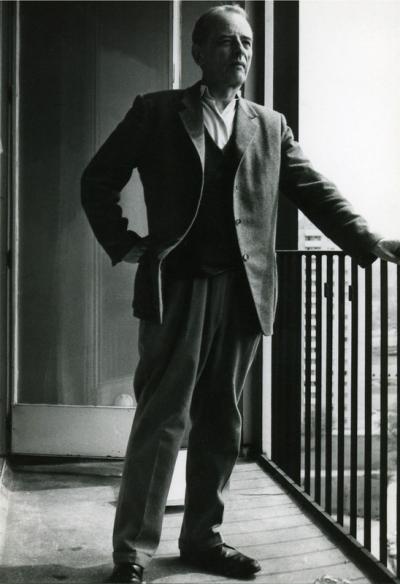Witold Wirpsza – Poet, author, translator

The book “Polaku, kim jesteś?” made Witold Wirpsza famous, but it also caused him a lot of problems. The critical confrontation with Poland and its people displeased the communist rulers so much that the censor imposed a publishing ban on him. As a consequence, the author settled permanently in West Berlin. Wirpsza fared well in Germany. There he was a respected authority on Poland and in demand as a commentator on Polish matters. His renown was also fuelled by the tumultuous time in Poland's history, with its strikes, demonstrations and the birth of the freedom movement. All of this aroused great interest in Poland within Germany, whilst Wirpsza, who was able to throw some light on the social background, became a mediator between Germany and Poland by helping to gradually eradicate the old clichés about the country on the Vistula. The special understanding for Poland that emerged in the Federal Republic in the 1970s was mainly due to Witold Wirpsza. The author also cultivated a lively intellectual exchange with his German peers and was in correspondence with Günter Grass, Karl Dedecius and Heinrich Böll, to name but a few. In conflicts, he acted as a mediator between German and Polish intellectuals. But life as an emigrant and the publishing ban in his homeland also had a negative impact on him. His absence meant that he disappeared from the consciousness of Polish readers and was forgotten as an author by many. His poems were only published in Poland “second time round” (drugi obieg) and two of his important volumes, “Cząstkowa próba o człowieku“ (Substudy on humans) and “Spis ludności” (The census), only came to light 20 years after his death.[4] The novel “Sama niewinność” (Innocence itself) from 1975, whose manuscript was discovered in the library at the Polish Museum in Rapperswil in Switzerland, had to wait until 2017 for its book launch.
Translations of German literature into Polish, which he had worked on with his wife Maria Kurecka, played an important role in Witold Wirpsza’s creative work. And from it arose a team of two exceptional translators. Leszek Szaruga remembers his parents: “Both of them were multilingual. In front of us children they argued in German, but when my sisters and I started to ‘get’ what it was about, they switched to French. They both spoke English and Russian as well (father since childhood- his mother, a Greek from Odessa, never managed to learn Polish, so Russian was the common language at home), and mother had learnt Italian and Danish. It was significant that both were very proficient in Latin thanks to their schooling. Ultimately, both of them enjoyed translating – mother more as an end in itself, whilst father saw it more as a workshop exercise that allowed him to test his Polish vocabulary: with a few exceptions, they translated texts that were important to them, even though, of course, they also worked for the money every now and then.”[5] Some of the works the couple translated included “Doctor Faustus” by Thomas Mann, “The Death of Vergil” by Hermann Broch, and Friedrichs Schiller’s “Mary Stuart”. Undoubtedly, Wirpsza’s musical streak had an influence on the texts that were selected and led to he and his wife translating the biography “Johann Sebastian Bach” by Albert Schweitzer and the Mozart novel “Wolfgang Amadé” by Valerian Tornius. In 1967, the couple’s joint work was awarded the Johann Heinrich Voß Prize for translations. Wirpsza also translated works of younger, little known Polish authors and was thus responsible for helping them gain more widespread attention in the Federal Republic. He also regularly discussed new Polish releases in the German press.
Wirpsza also gave lectures in poetiks at the Technical University in Berlin. On top of this, he and his wife worked with the emigrant press, such as “Kultura” in Paris and the Berlin magazine “Archipelag” as well. Witold Wirpsza died on 16 September 1985. He was buried at the Berlin Ruhleben cemetery. His remains were later moved to Warsaw. Since 2005, the Mikołowski Institute in Mikołów (Instytut Mikołowski) has gradually published the works of Witold Wirpsza which has reignited interest in the individual and in the works of the poet and author who has been somewhat forgotten. By 2018, 18 of his texts had been published, with some of them published for the first time. Literary critics are also slowly rediscovering the author Witold Wirpsza, with many ranking Wirpsza among the greatest talents in 20th century Polish literature, along with Tadeusz Różewicz, Miron Białoszewski and Zbigniew Herbert, because of his original style.
Monika Stefanek, February 2021
[4] Witold Wirpsza, article on the website Culture.pl, online: https://culture.pl/pl/tworca/witold-wirpsza (last accessed on 18/2/2021).
[5] Cited from: Leszek Żuliński, Wojna i miłość, online: https://latarnia-morska.eu/en/port-literacki/1978-listy-z-oflagu-witolda-wirpszy (last accessed on 18/2/2021).


